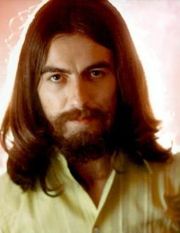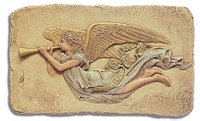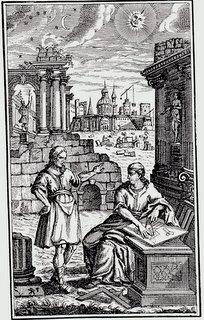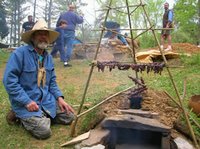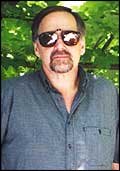
I said my last
"Be Seeing You" to one of my closest friends five years ago today. He passed away on April 8, 2001, at age 48, dying a painful death caused by food poisoning contracted at a local Atlanta restaurant.
Ron Bonds would have enjoyed the
Burning Taper website. From 1985 well into the '90s, he was sysop of
IllumiNet BBS, a private online bulletin board service operated from his home computer. The BBS was dedicated to conspiracies, esoteria, religion, cults, UFOs, exploring the New World Order, and Illumination of every kind. He was also the publisher of many esoteric, conspiracy and UFO books through his company IllumiNet Press. Ron was an expert on the JFK assassination and other conspiracy theories; he managed to believe all the theories without believing any of them, and taught me to do so, too.
One of the first books he published was an obscure novel called
The Idle Warriors. The book is a thinly disguised story about Lee Harvey Oswald's days in the Marine Corps, written by
Kerry Thornley, a platoon-mate of Oswald's. What makes it especially unique? The book was written
before the JFK assassination. Something about Oswald was that unique, that someone who knew him would write a book about him.
Ron and I became friends shortly after I first logged onto his BBS in 1987, and we remained so until he passed away in 2001. Not a day goes by that I don't want to call him up to share something interesting or weird or cool I just learned. We used to speak most every day.
Knowing Ron, especially in the early days, exposed me to esoterica of which I knew little or nothing.
Aleister Crowley, the
Golden Dawn,
Kaballah, Masonic conspiracy theory, New World Order paranoias, fundamentalist Christian wackiness, non-mainstream music, etc. — Ron was a treasure chest of knowledge about these and many other disciplines and topics. His mind was as sharp as anyone's I've ever met.
It was fun being in Ron's circle — he knew the most interesting and the most eccentric people, and was years ahead of his time on just about everything. Ron published several more of Kerry Thornley's books (
Principia Discordia,
Zenarchy, and more), and I got to meet Thornley several times. Ron was philosophizing and raving about
The Matrix long before the movie of the same name came out. He knew every assassination theory about every assassinated person forwards and backwards, inside and out. He used to book the band R.E.M. into his Decatur, Georgia nightclub for $100 a night before they hit it big. He traded ideas with Chris Carter, the man behind the
X-Files. He was a veteran of the Internet before most people had even heard of it. As a teenager, Ron played in a garage band in Atlanta with Mark David Chapman, the man who killed John Lennon. As Sam Rountree said at Ron's funeral, Ron would have been as rich as Bill Gates, except his timing sucked.
Ron was a news and media junkie. His television or his shortwave radio, or both, were always on, it seemed, whenever I'd visit or call.
Ron was fascinated and amused by the fanatical following that Elvis Presley had, even long after Elvis's demise. He loved everything about Elvis, except his music.
He once recorded and pressed his own 45 rpm single vinyl record — remember those? Using state of the art sampling techniques (for the time) he played around with Jim and Tammy Faye Bakker's voices at the height of their scandal, creating a tune called
Under the Blood. On the flip side was a mournful dirge called
Hess is Dead, about
Rudolf Hess, Hitler's deputy who was found hanged in Spandau Prison in 1987. He even designed a cover sleeve for the record. (Trivia: The spinning, hanged-on-an-electrical-cord corpse of Rudolf Hess is the source of the name of the band Spandau Ballet.)
Ron re-published John Keel's 1975 book
The Mothman Prophecies, and then sold the movie rights. The film, starring Richard Gere, was released in 2002. The true story tells about
the collapse of the Silver Bridge over the Ohio River on December 15, 1967 that killed 46 people, and of the "Mothman" that was seen by many people prior to that event, apparently as a warning about the impending bridge collapse. A
Mothman Prophecies death-list shows that many people associated with the movie have since died, many mysteriously. Ron is #55 on the list (which includes the 46 original deaths). For those who like to see weird correlations in everything: Point Pleasant, West Virginia, where the Mothman was repeatedly sighted, is in
Mason County.
My friend
GrouchoGandhi and I once saw Ron become invisible. We could still see him, but no one else could. When we asked how he did it, he simply quipped, "Read more Crowley."
In the late 1980s Ron, Gg and I and a few other geeks with modems created a mock religion that worshipped the Ones and Zeros of our computers. We called it "The First Church of Binary Consciousness, Digitarian." We'd hold "conclaves" at a local bar and consume lots of "holy water" (pitchers of cheap draft beer) regularly. Our church ranks swelled to about 25 people, as new visitors to his BBS would come out to meet us. I guess it didn't hurt our growth that everyone who joined the Church received their very own Pope certificate and got to call themselves by some cool Papal name. Ron's cool Papal name was Elvon Prezton. (Yeah, we borrowed the Pope idea from
Discordianism, which was co-founded in the 1950s by Kerry Thornley even before he wrote about Oswald.)
The Digitarians weren't the first mock church Ron had co-founded. Years earlier, he and Sam had written up documents for the
First Church of Beaver Cleaver (note the same initials as the Digitarian Church) and sold copies of the papers by mail. Those documents have now been digitized and can be found all over the Internet.
Ron was an emphatic non-joiner. He'd roll over in his grave (except he can't, he was cremated) if he knew I had become a Freemason. Ironically, in part it is because of knowing Ron that I became a Mason soon after he passed away.
In spite of all his levity and high weirdness and eclectic knowledge, Ron was at heart a very compassionate and caring man. Though I have hundreds of memories of him, the one that stands out most in my mind is the concern and the sheer moral outrage in his voice when he phoned me one day, shouting, "They're burning them! They're killing those children!" I'm talking about the
Branch Davidian incident at Waco in 1993. I remember turning on the TV when he called and staying on the phone with him as the compound was engulfed. It was a tragic moment in American history.
I also remember when his wife Nancy called me to tell me of his passing. That was a tragic moment in my personal history, one I'll never forget.
* * *Below is an article that ran in the
Atlanta Journal-Constitution a year after Ron died:
"All We Did was Go Out to Eat"By Jim Auchmutey,
Atlanta Journal-ConstitutionStaff Writer
Ron Bonds sold conspiracies. The Atlantan published books on unsolved mysteries and unexplained phenomena, from the Kennedy assassination to the ominous black helicopters of the New World Order. In the subculture of the paranormal, his reputation was such that writers for
The X-Files used to call him for ideas.
But nothing Bonds published was stranger than the final chapter of his life.
On a beautiful spring Saturday last year, Bonds and his wife, Nancy Kratzer, rose before dawn to work on the house they had just bought in the Morningside neighborhood of Atlanta. Late that morning, they broke for lunch and headed to a nearby Mexican restaurant, El Azteca on Ponce de Leon.
Bonds ordered a No. 7 combo — beef burrito, enchilada, beans and rice. He asked the server to make sure the food was hot. It hadn't been the last time he ate there.
"Is it hot enough?" Nancy asked when their lunches arrived.
"Lukewarm," Ron said — but he was too famished to send the plate back.
Fifteen hours later, after an agonizing evening of vomiting and diarrhea, Bonds was taken by ambulance from their home to Grady Memorial Hospital. As Kratzer waited among the families of trauma victims, she thought to herself: When this is over, I'm going to yell at Ron for putting me through this.
Not long before sunrise, she was shown into a private room. Doctors burst in. One of them broke the news: "Your husband didn't make it."
Kratzer glared at him in disbelief. "I don't think you have the right person," she said. "All we did was go out to eat."
A rare statisticAround 5:30 on the morning of April 8, 2001, Ronald W. Bonds, a 48-year-old Atlanta native whose black goatee was beginning to show flecks of gray, who liked to play guitar and argue politics over a beer and take long walks with his wife, became a statistic.
Every year in the United States, the Centers for Disease Control and Prevention estimates, more than 5,000 people die of food-borne illness — about 40 percent from something they ordered at a restaurant.
In Bonds' case, suspicion quickly fell on his last meal. The Fulton County medical examiner determined he died of internal bleeding caused by toxic bacteria in contaminated ground beef. He ruled the death accidental and listed the scene of the accident as 939 Ponce de Leon Ave.: El Azteca.
If the finding is correct — and the restaurant strongly disputes it — Bonds became the first person in decades to die of food poisoning from a metro Atlanta restaurant. County and state health authorities cannot remember the last local dining fatality.
"I've been here 29 years, and I've never heard of another death like that one," says Ferrell Curlee, who oversees restaurant inspections for the Gwinnett County Board of Health.
The death of Ron Bonds illuminates an area of government regulation many people take for granted. The public rarely thinks about restaurant inspections unless an outbreak of food poisoning hits the news, as it did a decade ago when four children died from E. coli-tainted hamburgers at Jack in the Box restaurants.
Georgia law requires county health departments to inspect restaurants at least twice a year. But the task has become increasingly difficult as eateries have mushroomed with the population, making restaurant safety another area, like traffic or air quality, where growth has authorities scrambling to keep up.
In the past five years, the number of permitted food service establishments in metro Atlanta — from restaurants to school cafeterias to sandwich carts — has increased by more than 50 percent. Yet the number of full-time inspectors has changed little and has declined in one county, Fulton, home of 15 percent of the state's restaurants. Budget cuts have reduced the county's inspection force from 35 to 23.
"We're having to do more with less," says Adewale Troutman, director of the Fulton County Department of Health and Wellness.
Whether more frequent or tougher inspections would have spared Bonds, however, is an open question.
"We still don't know what happened in that kitchen," says attorney Mark Harper, who represents Kratzer in a wrongful death lawsuit against El Azteca.
The suit, now in the deposition phase, does not specify damages. Kratzer says she doesn't care about the money.
"I just want people to know what can happen," she says. "And I want to see that dump closed."
Conspiracy theoriesIt has been more than a year since her husband died, but his presence still inhabits the cream-colored bungalow they shared in Morningside. His guitar rests in a stand in the living room. His Fabulous Fifties Bakelite radio decorates the mantel. His Mission-style easy chair faces the big-screen TV, as if he had just stepped out.
"It was months before I could bring myself to sit in it," says the 47-year-old widow, a slender Michigan native whose nervous manner suggests the emotional turmoil within. She's still struggling with an ulcer.
They met in the mid-'80s when both were working at the Turtle's record store chain. Bonds was a character, an opinionated ironist who wanted to be a music promoter and had started his own record label, EOD ("Elvis on Drugs"), and his own mock faith, the Church of Beaver Cleaver.
Bonds had always been fascinated by conspiracies and mysteries. Shortly after the couple married in 1990, he announced he was getting into the publishing business. He didn't have to look far for an author: Kerry Thornley, a down-and-out veteran who was washing dishes at a Mexican joint in Little Five Points. Thornley had served in the Marines with Lee Harvey Oswald, and his novel based on the experience,
The Idle Warriors, became the first product of Bonds' company, IllumiNet Press.
The press issued three or four books a year, Bonds handling the manuscripts while Kratzer did the typesetting and accounts. One title, a UFO thriller called
The Mothman Prophecies, became a movie starring Richard Gere. Their best seller, at 40,000 copies, was
Black Helicopters Over America, a diatribe against the New World Order that Bonds cooked up with author Jim Keith.
"They laughed all the way to the bank with that one," Kratzer says. "Ron didn't really believe all that stuff. But there were people who did, and he just fed their craziness."
In his final spring, Bonds had every reason to feel good about himself. The publishing business was perking along, and the couple had just bought a second house intown as an investment. What's more, he had gone on a low-carb diet and shed 30 pounds.
Bonds did have a health problem, though. He suffered from diverticulosis, a common condition in which the intestines are scarred by small saclike growths. He avoided nuts, strawberries and other foods that could lodge in the sacs and untrack his digestion.
Toxic bacteria could lodge in the sacs, too.
After lunch that Saturday, the couple ran some errands and returned home for the evening. Ron settled in with his shortwave radio while Nancy curled up with a TV movie. She says he ate nothing else except some carrot cake.
Around 9 p.m., Ron told her he was feeling sick and disappeared into a bathroom. Nancy checked on him from time to time, thinking he had a stomach virus, then drifted off to sleep. She woke before midnight with cramps of her own and retreated to the other bathroom. She didn't know Ron had gotten worse and was vomiting repeatedly.
About 3 a.m., he asked her to call 911.
By the time the ambulance arrived, Ron was sprawled on the dining room floor, dehydrated and complaining of muscle seizures in his legs. The paramedics helped him back into a bathroom. After a while, Nancy called out to see how he was doing. No answer. She cracked the door and saw Ron mumbling to himself, his eyes rolled back.
"Your husband's in bad shape," one of the EMTs told her as they loaded him onto a stretcher and sped off to Grady.
It was the last time she saw him alive.
Unraveling the mysteryKratzer suspected food poisoning all along, but she received no confirmation until the death certificate arrived more than a month after her husband's body was cremated.
During an autopsy, the medical examiner found copious amounts of blood in the bowels, so he sent a stool sample to the Georgia Public Health Laboratory in Decatur. The lab discovered high levels of
Clostridium perfringens Type A, a bacterium often seen in small quantities in beef and poultry. When it occurs in larger quantities — anything above 100,000 organisms per gram is considered unsafe — it can release toxins that cause diarrhea, vomiting and, rarely, hemorrhaging. The bacterium figures in 250,000 cases of food poisoning a year, the CDC estimates, only seven of which result in death.
"It's not one of the common forms of food poisoning," says Paul Mead, an epidemiologist with the CDC's Foodborne and Diarrheal Diseases Branch.
Four days after Bonds ate there, epidemiologists visited El Azteca to collect samples of ground beef from the steam table. When C. perfringens becomes dangerous, it usually has to do with cooked meat being held at too low a temperature. The lab found 6 million organisms per gram — 60 times the safety threshold.
A microbiologist at the lab also ran genetic fingerprinting tests to compare the bacteria from the food with cultures from Bonds' and Kratzer's stool samples. The DNA strands were found to be almost identical, suggesting the bacteria came from the same source.
In the meantime, the health department asked El Azteca for credit card receipts covering the days when Bonds had eaten there and when the food samples had been taken. Of the 35 customers reached by phone, seven reported gastrointestinal problems.
On April 18, the department placed El Azteca on probation for six months, meaning it had to meet stricter health standards during frequent, unannounced inspections. The probation was eventually lifted. Despite the death, the restaurant was never forced to close.
That infuriated Kratzer. Last summer, she fired off an e-mail to colleagues at Emory University, where she works as an administrator in the business school, warning them about El Azteca.
"Please pass this message on, and please, for your safety: DON'T EAT THERE!" she wrote.
The e-mail ricocheted around Atlanta for weeks. Kratzer eventually received more than 300 replies from people who wanted to express sympathy or share their own gut-wrenching dining experiences.
As word spread, the restaurant's business plummeted. But it gradually recovered, and by this spring, the patio out front was again teeming with margarita sippers.
The sight galls Kratzer. "I drive by there," she says, "and I think: You fools!"
Restaurant responseIn a way, El Azteca is a classic American success story. A family of Mexican immigrants opened the first restaurant two decades ago in Sandy Springs and expanded into a chain of more than a dozen outlets. In 1996, they sold the location on Ponce to Bernie Eisenstein, an Atlanta restaurant broker. He still owns the store — which is not affiliated with the others — and can usually be found there before lunch conducting business from a front table as oven-mitted waiters dash to and fro.
Eisenstein declined to comment on the Bonds case. "He thinks he's being inappropriately blamed," says his lawyer, Richard Foster.
The attorney is mounting a vigorous defense. In depositions, Foster has raised questions about whether the food samples were handled incorrectly, allowing bacteria to fester en route from the restaurant to the lab. He also points out that Kratzer admits she and her husband ate ground beef at home on the Thursday or Friday night before they visited El Azteca.
"There's no question that Ron Bonds died because he had diverticulosis and ingested this bacteria," Foster says. "The question is: Where did it come from?"
The restaurant's health record has been scrutinized in the early rounds of the lawsuit. Inspectors testified they received previous complaints of sickness from meals at El Azteca, they found evidence of rat infestation, and one caller reported finding a roach in a burrito.
Over the past three years, health officers have scored the restaurant in the 80s and 90s (out of 100) with two exceptions: A 65 in October 1999 and a 69 in February 2001.
One of the items cited was improper temperature on the steam table.
The 'simple' theoryAfter Bonds died, some of his friends in the conspiracy underground were suspicious. One of his authors, Kenn Thomas, editor of a Web site called the
Steamshovel Press ("All conspiracy. No theory."), went so far as to suggest in a book that the Atlantan's demise was part of a plot against another writer, Jim Keith, who was investigating the Princess Diana "assassination" when he died under odd circumstances three years ago. Keith injured his knee falling off a stage at the Burning Man arts festival in Nevada and suffered a fatal blood clot during surgery.
"I don't have all the dots connected, but my suggestion is that someone wanted to silence Keith — and Ron was Keith's publisher," Thomas maintains.
Hearing this scenario, Kratzer rolls her eyes. While her husband would have appreciated such a flight of imagination — indeed, he might have published it — she doesn't need international conspiracies to understand his death.
She subscribes to the single-burrito theory.
"It's simple," she says. "Someone went out to eat and died. That's not supposed to happen."
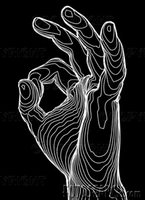 Ron Bonds
Ron Bonds |
Illuminet BBS |
Illuminet Press |
Food Poisoning |
Freemasonry |
Occult |
First Church of Beaver Cleaver |
Kerry Thornley |
John Keel |
Single Burrito Theory |
First Church of Binary Consciousness, the Digitarians |
Restaurants |
Digitarianism |
Conspiracy |
Conspiracy Theory |
Diverticulosis |
Mexican Restaurants |
Mothman Prophecies |
Black Helicopters over America |
Be Seeing You
 The CIA has discovered blogs, it seems. Watch what you write in your online diary.
The CIA has discovered blogs, it seems. Watch what you write in your online diary.